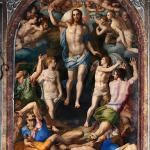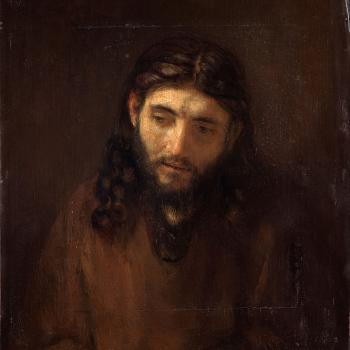Non-Literal Biblical Descriptions of God and His Attributes
Appendix of my book (available for free online), Inspired!: 191 Supposed Biblical Contradictions Resolved. See the Introduction and ch. 1: How Do Atheists Define a “Biblical Contradiction”? All Bible passages RSV unless otherwise noted.
Anthropopathism is a fancy word for the attribution of non-physical human emotions and passions to God. The related term, anthropomorphism, is the attribution of physical human properties (or animal properties such as wings) to God. Historic Christian theology recognized the metaphorical nature of the many anthropomorphisms in Scripture since it held that God the Father is a spirit. The overwhelming consensus of Christian theology through the centuries has been that God is immutable (always the same; without any change), so that it would be impossible for him to “repent” or “change his mind.” This is also inconsistent with omniscience, or possessing all knowledge (see Num. 23:19; Mal. 3:6; James 1:17).
God “condescends” to the limited understanding of human beings, by expressing many truths about himself analogically (as compared to human actions and emotions) so that we are able to understand him. Otherwise, we would not be able to comprehend a Being so startlingly different and distinct from us, and infinitely “higher” than we are (Isa. 55:8-9; Rom. 11:33-34). Thus, the passages (in this framework) that say he doesn’t and cannot change are to be interpreted literally, while the ones stating the opposite (Exod. 32:14; 1 Sam. 15:35; Jer. 26:13, 19; Amos 7:3, 6; Jon. 3:10) are to be interpreted figuratively or metaphorically, in light of the understanding of anthropomorphism and anthropopathism as common Hebrew idioms.
Many atheists (I know this firsthand from hundreds of debates) are predisposed to think that the Bible writers (especially the authors of the Old Testament books) were primitive Bronze Age and Iron Age nomadic troglodytes who didn’t know a thing about history, logic, or literature. The truth of the matter is far more complex. The Bible is an extraordinarily sophisticated collective work of literature, and the Hebrew language and culture was very rich in non-literal figurative idioms and linguistic expressions. The ignorance of atheists, other Bible skeptics, and sadly, also many Christians who believe that the Bible is inspired and infallible and inerrant, in this regard, has led to many gross misinterpretations of lots of biblical texts: dead-wrong and as far from the truth as it can get.
Anglican Bible scholar E. W. Bullinger (1837-1913) catalogued “over 200 distinct figures [in the Bible], several of them with from 30 to 40 varieties”: as he stated in the Introduction to his 1104-page volume, Figures of Speech Used in the Bible (London: 1898). He devotes 27 pages (pp. 871-897) to “Anthropopatheia; or, Condescension”: with scores and scores of examples. He wrote in his introduction to this section:
The Ascribing of Human Attributes, etc., to God.
An-thrôp´-o-path-ei´-a. Greek, ἀνθρωποπάθεια, from ἄνθρωπος (anthropos), man, and πάθος (pathos), affections and feelings, etc. (from πάσχειν, paschein), to suffer).
This figure is used of the ascription of human passions, actions, or attributes to God.
The Hebrews had a name for this figure, and called it דֶרֶךְ בְנֵי אָדָם (Derech Benai Adam), the way of the sons of man.
The Greeks had another name for it: SYNCATABASIS (Syn´-cat-ab´-a-sis), from σύν (syn), together with, κατά (kata), down, and βαίνειν (bainein), to go: a going down together with: i.e., God, by using this figure, condescends to the ignorance and infirmity of man.
Hence, the Latin name for it was CONDESCENSIO, condescension. (p. 871)
James Strong and John McClintock, in their Cyclopedia of Biblical, Theological, and Ecclesiastical Literature (Harper and Brothers; New York: 1880, “Anthropomorphism”) provided a very helpful analysis:
The term is also used to denote that figure of speech by which the sacred writers attribute to God parts, actions, and affections which properly belong to man; as when they speak of the eyes of God, his hand, etc. Anthropomorphism (ἀνθρωπόμορφος) differs from anthropopathy (ἀνθρωποπαθής) in this: the first is the attributing to God any thing whatever which, strictly speaking, is applicable to man only; the second is the act of attributing to God passions which belong to man’s nature.
Instances of both are found in the Scriptures, by which they adapt themselves to human modes of speaking, and to the limited capacities of men . . . These anthropopathies we must, however, interpret in a manner suitable to the majesty of the Divine nature. Thus, when the members of a human body are ascribed to God, we must understand by them those perfections of which such members are in us the instruments. The eye, for instance, represents God’s knowledge and watchful care; the arm his power and strength; his ear the regard he pays to prayer and to the cry of oppression and misery, etc. Farther, when human affections are attributed to God, we must so interpret them as to imply no imperfection, such as perturbed feeling, in him. When God is said to repent, the antecedent, by a frequent figure of speech, is put for the consequent; and in this case we are to understand an altered mode of proceeding on the part of God, which in man is the effect of repenting. . . .
A rational being, who receives impressions through the senses, can form conceptions of the Deity only by a consideration of his own powers and properties . . . Anthropomorphitic modes of thought are therefore unavoidable in the religion of mankind; and although they can furnish no other than corporeal or sensible representations of the Deity, they are nevertheless true and just when we guard against transferring to God qualities pertaining to the human senses. It is, for instance, a proper expression to assert that God knows all things; it is improper, that is, tropical or anthropomorphitic, to say that he sees all things. Anthropomorphism is thus a species of accommodation (q.v.), inasmuch as by these representations the Deity, as it were, lowers himself to the comprehension of men. We can only think of God as the archetype of our own spirit, and the idea of God can no longer be retained if we lose sight of this analogy.
Another classic in Christian literature is Nave’s Topical Bible (New York: Thomas Nelson: 1897), compiled by Methodist theologian Orville J. Nave (1841-1917). He included a helpful list of Anthropomorphisms in the Bible. Here is much of that (my abbreviation). He utilizes the King James Version (1611), but also sometimes the Revised Version (1885):
Genesis 2:2-3 And on the seventh day God ended his work which he had made; and he rested on the seventh day from all his work which he had made. And God blessed the seventh day, and sanctified it: because that in it he had rested from all his work which God created and made.
Genesis 2:19 And out of the ground the Lord God formed every beast of the field, and every fowl of the air; and brought them unto Adam to see what he would call them: and whatsoever Adam called every living creature, that was the name thereof.
Genesis 6:6 And it repented the Lord that he had made man on the earth, and it grieved him at his heart.
Genesis 9:16 And the bow shall be in the cloud; and I will look upon it, that I may remember the everlasting covenant between God and every living creature of all flesh that is upon the earth.
Genesis 11:5 And the Lord came down to see the city and the tower, which the children of men builded.
Genesis 11:7 Go to, let us go down, and there confound their language, that they may not understand one another’s speech.
Genesis 18:17-19 And the Lord said, Shall I hide from Abraham that thing which I do; Seeing that Abraham shall surely become a great and mighty nation, and all the nations of the earth shall be blessed in him? For I know him, that he will command his children and his household after him, and they shall keep the way of the Lord, to do justice and judgment; that the Lord may bring upon Abraham that which he hath spoken of him.
Genesis 18:21 I will go down now, and see whether they have done altogether according to the cry of it, which is come unto me; and if not, I will know.
Genesis 18:33 And the Lord went his way, as soon as he had left communing with Abraham: and Abraham returned unto his place.
Genesis 19:29 And it came to pass, when God destroyed the cities of the plain, that God remembered Abraham, and sent Lot out of the midst of the overthrow, when he overthrew the cities in the which Lot dwelt.
Genesis 22:12 And he said, Lay not thine hand upon the lad, neither do thou any thing unto him: for now I know that thou fearest God, seeing thou hast not withheld thy son, thine only son from me.
Genesis 28:13 And, behold, the Lord stood above it, and said, I am the Lord God of Abraham thy father, and the God of Isaac: the land whereon thou liest, to thee will I give it, and to thy seed;
Genesis 35:13 And God went up from him in the place where he talked with him.
Exodus 2:24 And God heard their groaning, and God remembered his covenant with Abraham, with Isaac, and with Jacob.
Exodus 3:8 And I am come down to deliver them out of the hand of the Egyptians, and to bring them up out of that land unto a good land and a large, unto a land flowing with milk and honey; unto the place of the Canaanites, and the Hittites, and the Amorites, and the Perizzites, and the Hivites, and the Jebusites.
Exodus 14:24 And it came to pass, that in the morning watch the Lord looked unto the host of the Egyptians through the pillar of fire and of the cloud, and troubled the host of the Egyptians,
Exodus 20:5 Thou shalt not bow down thyself to them, nor serve them: for I the Lord thy God am a jealous God, visiting the iniquity of the fathers upon the children unto the third and fourth generation of them that hate me;
Exodus 31:17 It is a sign between me and the children of Israel for ever: for in six days the Lord made heaven and earth, and on the seventh day he rested, and was refreshed.
Exodus 32:14 And the Lord repented of the evil which he thought to do unto his people.
Numbers 11:25 And the Lord came down in a cloud, and spake unto him, and took of the spirit that was upon him, and gave it unto the seventy elders: and it came to pass, that, when the spirit rested upon them, they prophesied, and did not cease.
Judges 2:18 And when the Lord raised them up judges, then the Lord was with the judge, and delivered them out of the hand of their enemies all the days of the judge: for it repented the Lord because of their groanings by reason of them that oppressed them and vexed them.
1 Samuel 15:35 And Samuel came no more to see Saul until the day of his death: nevertheless Samuel mourned for Saul: and the Lord repented that he had made Saul king over Israel.
2 Samuel 24:16 And when the angel stretched out his hand upon Jerusalem to destroy it, the Lord repented him of the evil, and said to the angel that destroyed the people, It is enough: stay now thine hand. And the angel of the Lord was by the threshing place of Araunah the Jebusite.
1 Chronicles 21:15 And God sent an angel unto Jerusalem to destroy it: and as he was destroying, the Lord beheld, and he repented him of the evil, and said to the angel that destroyed, It is enough, stay now thine hand. And the angel of the Lord stood by the threshing floor of Ornan the Jebusite.
Psalm 31:2 Bow down thine ear to me; deliver me speedily: be thou my strong rock, for an house of defence to save me.
Psalm 33:6 By the word of the Lord were the heavens made; and all the host of them by the breath of his mouth.
Psalm 35:1-3 Plead my cause, O Lord, with them that strive with me: fight against them that fight against me. Take hold of shield and buckler, and stand up for mine help. Draw out also the spear, and stop the way against them that persecute me: say unto my soul, I am thy salvation.
Psalm 36:7 How excellent is thy lovingkindness, O God! therefore the children of men put their trust under the shadow of thy wings.
Psalm 57:1 Be merciful unto me, O God, be merciful unto me: for my soul trusteth in thee: yea, in the shadow of thy wings will I make my refuge, until these calamities be overpast.
Psalm 68:17 The chariots of God are twenty thousand, even thousands of angels: the Lord is among them, as in Sinai, in the holy place.
Psalm 94:9 He that planted the ear, shall he not hear? he that formed the eye, shall he not see?
Psalm 121:4 Behold, he that keepeth Israel shall neither slumber nor sleep.
Isaiah 1:15 And when ye spread forth your hands, I will hide mine eyes from you: yea, when ye make many prayers, I will not hear: your hands are full of blood.
Ezekiel 1:24 And when they went, I heard the noise of their wings, like the noise of great waters, as the voice of the Almighty, the voice of speech, as the noise of an host: when they stood, they let down their wings.
Ezekiel 1:28 As the appearance of the bow that is in the cloud in the day of rain, so was the appearance of the brightness round about. This was the appearance of the likeness of the glory of the Lord. And when I saw it, I fell upon my face, and I heard a voice of one that spake.
Habakkuk 1:13 Thou art of purer eyes than to behold evil, and canst not look on iniquity: wherefore lookest thou upon them that deal treacherously, and holdest thy tongue when the wicked devoureth the man that is more righteous than he?
1 Peter 3:12 For the eyes of the Lord are over the righteous, and his ears are open unto their prayers: but the face of the Lord is against them that do evil.
Walking
Genesis 3:8 And they heard the voice of the Lord God walking in the garden in the cool of the day: and Adam and his wife hid themselves from the presence of the LORD God amongst the trees of the garden.
Leviticus 26:12 And I will walk among you, and will be your God, and ye shall be my people.
Deuteronomy 23:14 For the Lord thy God walketh in the midst of thy camp, to deliver thee, and to give up thine enemies before thee; therefore shall thy camp be holy: that he see no unclean thing in thee, and turn away from thee.
Job 22:14 Thick clouds are a covering to him, that he seeth not; and he walketh in the circuit of heaven.
Habakkuk 3:15 Thou didst walk through the sea with thine horses, through the heap of great waters.
Resting
Genesis 2:2-3 And on the seventh day God ended his work which he had made; and he rested on the seventh day from all his work which he had made. And God blessed the seventh day, and sanctified it: because that in it he had rested from all his work which God created and made.
Exodus 20:11 For in six days the Lord made heaven and earth, the sea, and all that in them is, and rested the seventh day: wherefore the Lord blessed the sabbath day, and hallowed it.
Exodus 31:17 It is a sign between me and the children of Israel for ever: for in six days the Lord made heaven and earth, and on the seventh day he rested, and was refreshed.
Deuteronomy 5:14 But the seventh day is the sabbath of the Lord thy God: in it thou shalt not do any work, thou, nor thy son, nor thy daughter, nor thy manservant, nor thy maidservant, nor thine ox, nor thine ass, nor any of thy cattle, nor thy stranger that is within thy gates; that thy manservant and thy maidservant may rest as well as thou.
Hebrews 4:4 For he spake in a certain place of the seventh day on this wise, And God did rest the seventh day from all his works.
Hebrews 4:10 For he that is entered into his rest, he also hath ceased from his own works, as God did from his.
Does not faint
Isaiah 40:28 Hast thou not known? hast thou not heard, that the everlasting God, the Lord, the Creator of the ends of the earth, fainteth not, neither is weary? there is no searching of his understanding.
Amazement
Isaiah 59:16 And he saw that there was no man, and wondered that there was no intercessor: therefore his arm brought salvation unto him; and his righteousness, it sustained him.
Isaiah 63:5 And I looked, and there was none to help; and I wondered that there was none to uphold: therefore mine own arm brought salvation unto me; and my fury, it upheld me.
Mark 6:6 And he marvelled because of their unbelief. And he went round about the villages, teaching.
Laughing
Psalm 2:4 He that sitteth in the heavens shall laugh: the Lord shall have them in derision.
Psalm 37:13 The Lord shall laugh at him: for he seeth that his day is coming.
Psalm 59:8 But thou, O Lord, shalt laugh at them; thou shalt have all the heathen in derision.
Proverbs 1:26 I also will laugh at your calamity; I will mock when your fear cometh;
Sleeping
Psalm 44:23 Awake, why sleepest thou, O Lord? arise, cast us not off for ever. Psalm 78:61 And delivered his strength into captivity, and his glory into the enemy’s hand.
In light of the fact that there are so very many instances of this figure of speech in the Bible, I have not dealt with them individually, as I would simply be repeating the same thing over and over, “This is an anthropomorphism and not to be taken literally . . .” etc. That makes for very boring and tedious reading. Instead, I thought it best to include this appendix, so that Bible readers and Christians seeking to defend the Bible from irrational and unfounded attacks would have an understanding of how to approach passages of this sort.
I did, however, take the opportunity to explain anthropomorphism in one section, “How can God regret or change his mind about what he has done (Gen. 6:6-7; 1 Sam. 15:10-11, 35), if he is omniscient and knows all things?” (# ???). And I did so by explaining it in light of a comparison of relevant Bible passages on the same topic: some literal and some figurative. In other words, I employed the well-known hermeneutical (interpretational) principle of “explaining the harder to understand biblical passages by easier to understand ones on the same topic.”
To illustrate how pervasive is the atheist misuse / misrepresentation / misunderstanding of these passages in the attempt to present a supposedly overwhelming “biblical cluelessness,” In one typical atheist list of alleged direct contradictions in Holy Scripture, I found fifteen entries that were based on not understanding this aspect:
Does God have a body?
Does God repent?
Can God be seen?
Does God ever tire?
Did Moses see God face to face?
How long does God’s anger last?
Is it OK to test (or tempt) God?
Does God dwell in darkness or in light?
Does God dwell in temples?
Where does God dwell?
Does God sleep?
Does God ever get furious?
Does God work on the Sabbath?
Has anyone ever heard God’s voice?
Did the Israelites see God face to face on Mount Horeb?
This happens very often. If I had a dime for every time I have personally encountered it in my apologetics discussions over the last 41 years, I’d be rich as Croesus. Ignorance of the massive use of non-figurative idiom in the Bible is sadly very widespread. All we can do is try to educate folks. If we Christians don’t understand the very nature of biblical literature; how to properly interpret it and to know when non-literal idiom is being employed, then we will clearly be out to sea and unsuccessful before we even begin, when we attempt to defend the Bible from skeptical attacks.
*****
*
Photo Credit: God the Father (c. 1635-1640), by Guercino (1591-1666) [public domain / Wikimedia Commons]
***
Summary: Appendix of Dave Armstrong’s book, “Inspired!”: in which he examines the vastly misunderstood literary forms of biblical anthropomorphism and anthropopathism.














